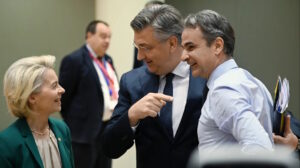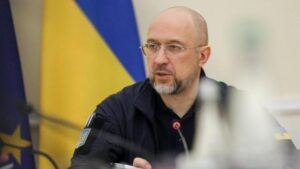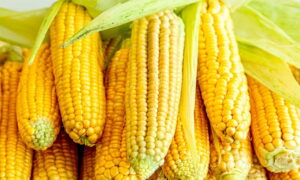
The prime ministers of Croatia and Greece may run for the presidency of the European Commission, German newspaper Bild reports, citing EU sources. “As an EU insider told BILD, two possible alternatives have already been proposed. Greek Prime Minister Kyriakos Mitsotakis (56, a powerful and influential member of the European People’s Party) and Croatian Prime Minister Andrej Plenkovic (54, won the internal elections this week) have expressed interest,” the Bild article says.
In March of this year, the European People’s Party voted to support European Commission President Ursula von der Leyen as a candidate for the post of European Commission President.
The President of the European Commission is appointed by the European Parliament, the elections to which will be held on June 6-9 this year.

The Steering Board of the Ukraine Investment Framework, set up by the EU on April 17 under the Ukraine Facility instrument, has allocated more than EUR1bn of funding to de-risk investments, mainly of small and medium-sized enterprises in Ukraine, through International Financial Institutions (IFIs) and banks, Ukraine’s Deputy Economy Minister Oleksiy Sobolev said.
“That is, this year, financing for SME development will be enough,” he said at Ukraine’s Future Summit in Brussels on April 18.
Sobolev called for more active trade and joint ventures with Ukrainian companies, because the above mechanism will provide leverage and additional guarantees.
“Thanks to the Ukraine Plan and Ukraine Facility, you will have available financing for business expansion in Ukraine, and what we need right now will be available. This year it will be available through Ukrainian banks and through MFIs: EBRD, EIB, IFC, KfW”, – said the Deputy Minister of Economy.
He specified that about 20 Ukrainian banks participate in these programs.
“So, in fact, you can apply to your Ukrainian bank, and he will provide additional financing to your companies,” – explained Sobolev.

Prime Minister of Ukraine Denys Shmyhal said that Ukraine seeks to start negotiations on joining the European Union as soon as possible – no later than June this year, the Communications Department of the Secretariat of the Cabinet of Ministers of Ukraine reported on Friday.
“We expect the EU to approve the negotiation framework for us without delay. We see no objective obstacles that could prevent this. We are actively supported by all European countries,” Shmyhal said at the panel “European Integration of Ukraine, its Regions and Territorial Communities” at the forum “Life of Regions in War.”
He added that Ukraine has reliable partners in the EU who are ready to help and share their experience for the successful completion of the negotiation process.
The Prime Minister noted that Ukraine has done all the homework to start negotiations on joining the EU. “The European Commission has confirmed that Ukraine has fulfilled all the conditions. We have demonstrated well-coordinated work. Today, the President announced a proposal to develop an infrastructure for European integration. This should include representatives from the government to communities who will work with European funds,” Shmyhal said.
He added that the Ukrainian government, for its part, is ready to help communities attract as much money as possible from the EU. At the same time, the main problem remains the ability of communities to prepare and present relevant projects. “This should be a priority for communities. Because this year we have access to European funds. Ukraine has moved from candidate status to negotiator status. And this gives us additional opportunities,” Shmyhal said.

In 2023, Metinvest Mining and Metallurgical Group sold 48% of its steel and mining products in the European Union (EU), compared to 49% in 2022.
According to the Group’s annual report, in 2023, Metinvest sold 35% of its total products in Ukraine (28% in 2022), 2% (7%) in MENA, 1% (3%) in the CIS, 7% (4%) in Asia, 6% (6%) in North America and 1% (3%) in other regions for a total of $7.397 billion ($8.288 billion).
At the same time, the share of the company’s steel segment’s revenue in the EU last year was 50% (49% in 2022), it sold 38% of its steel products in Ukraine (30%), 3% (10%) in MENA, 1% (4%) in the CIS, no supplies in Asia in 2023 or 2022, 7% (6%) in North America, and 1% (1%) in other regions for a total of $4.846 billion ($5.716 billion).
In addition, the company’s share of iron ore sales in the EU in 2023 was 44% (51%), in Ukraine – 30% (22%), in MENA – 0% (2%), in Asia – 20% (13%), in North America – 5% (6%), and in other regions – 1% (7%) for a total of $2.551 billion ($2.572 billion).

Contrary to forecasts, Ukrainian corn has started to rise in price on world markets due to increased demand from China, Turkey, Egypt and the European Union, according to the analytical cooperative “Pusk”, created within the framework of the All-Ukrainian Agrarian Council (AAC).
“The expectations of the trade that with the arrival of a new corn crop from Argentina on the world market, demand and prices for Ukrainian grain would fall, did not materialize. Argentine new crop is sold at higher prices than Ukrainian corn. We can predict a rise in prices for corn from Ukraine in the coming weeks,” the analysts said.
According to them, China is actively contracting Ukrainian corn. Other importers, such as Turkey, Egypt, Italy, and Spain, have also started buying a lot of Ukrainian corn. In seaports, the conditional prices for it have risen to $142-145/ton and have been increasing for a week and a half. The supply is sinking, while demand is stable.
“It can be predicted that amid demand, prices will add $2-3 per tonne per week and reach at least $150/tonne on a CPT basis by the end of March,” the experts emphasized.
They said that in April, the main factor of corn price changes will be the information on the grain harvest in Brazil. In April, there will be more reliable information about the harvest in Brazil: the planted areas, soil moisture, and crop condition. This will affect the global market. If the drought continues in Brazil and the harvest is reduced, the price will rise. But for now, this is one of the scenarios. In case of rainfall in Brazil, the situation on the global corn market will be different.
On a DAP basis, Ukrainian corn is traded for delivery in March-April to Italy, Austria and Germany in the range of $192-197/ton, Pusk summarized.

The European Union will support Ukraine with transitional financing under the Ukraine Facility program, for which Ukraine will bring the State Land Cadastre and the State Register of Real Property Rights into line, as well as approve measures to support the implementation of industrial parks as a tool for attracting investment to the de-occupied territories.
As the Economy Ministry reported on Friday, these two steps, which are necessary to receive transitional funding, are currently under development.
The Ministry of Economy noted that three other steps have already been taken: the adoption of the National Revenue Strategy for 2024-2030; amendments to the Law on the Prosecutor’s Office and to laws to strengthen the independence of the Special Anti-Corruption Prosecutor’s Office and additional measures to prevent and combat illicit proceeds and terrorist financing.
The Ministry clarified that these five indicators were envisaged in the Ukraine Facility Plan, which has been discussed with the EU all along, for the beginning of 2024.
The Ministry of Economy noted that the Cabinet of Ministers on Friday, March 8, approved the text of the Memorandum of Understanding between Ukraine and the EU on transitional financing under the Ukraine Facility program, as well as the relevant loan agreement. After the signing of the documents, scheduled for March 11, Ukraine will be able to receive EUR 6 billion to cover current state budget expenditures until the program is fully launched.
It is explained that the signing of the Memorandum will allow Ukraine to attract EUR 4.5 billion in March 2024 to maintain macro-financial stability, and the next EUR 1.5 billion in April 2024.
As reported, in February 2024, the European Parliament approved the regulations of the Ukraine Facility program. According to it, the EU’s support for Ukraine in 2024-2027 will amount to EUR 50 billion, of which EUR 38.27 billion will be allocated to support the state budget, of which Kyiv expects EUR 16 billion in 2024.
The Ukraine Facility Plan is a technical document required to implement the EU’s financial support program for Ukraine. The plan is not a general renewal strategy, it will cover only a part of the state changes envisaged for the coming years with a focus on macroeconomic growth, the Ministry of Economy points out.
The preparation of the Plan is carried out by the government under the coordination of the Ministry of Economy in constant consultation with representatives of the European Commission, which ensured that the document meets most of the requirements of the approved regulations at the preliminary preparation stage, the ministry added.